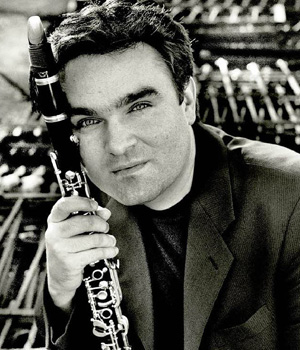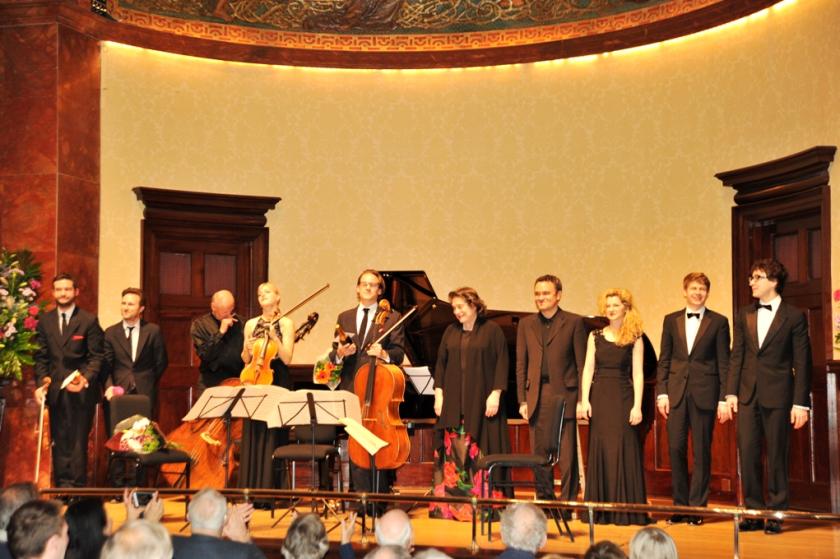It was a massive but never overbearing three-parter, a three-and-a-half hour celebration, a mini-festival of youth and experience. Wouldn’t we all want to mark a major birthday in the company of friends of all ages? Elisabeth Leonskaja, much-loved torchbearer for the comprehensive manner of mentor and duo-partner Sviatoslav Richter, played with them all – members of the Doric Quartet, genius composer and most vivacious of clarinettists Jörg Widmann, Vienna Phil double-bass doyen Alois Posch and, most bracingly of all, three of her own acolytes making their very distinguished ways in the world.
Let’s begin, programme-wise, with them, since the very start of the Brahms four-hand Waltzes of Op. 39 instantly took away the sour taste of an opinionater in a current weekly sounding off about Brahms as boring miserabilist. Well, frankly, who cares about other people’s blind spots? But this music just laughed in his face at times, above all with the gayest of all minatures, No. 6 in C sharp major. Samson Tsoy and Pavel Kolesnikov sparkled with cut-diamond brilliance; Alexandra Silocea, taking over with Leonskaja (pictured below) at her left, offered delicacy and planted the earworm of the gorgeous No. 15 in E flat major.
 Heart-easing chamber works bookended the programme. Mozart’s G minor Piano Quartet may start severely, but ends up with one of the most delicious rondos in the repertoire, teeming with ideas for both piano and string trio (Alex Redington, Hélène Clement and John Myerscough of the Doric Quartet, warming by degrees along with the music). Leonskaja knows how to gauge the silences and Mozart’s odd little turns of humorous phrase, and a brilliant mini-cadenza of a link ended in a sly “Happy birthday to me”.
Heart-easing chamber works bookended the programme. Mozart’s G minor Piano Quartet may start severely, but ends up with one of the most delicious rondos in the repertoire, teeming with ideas for both piano and string trio (Alex Redington, Hélène Clement and John Myerscough of the Doric Quartet, warming by degrees along with the music). Leonskaja knows how to gauge the silences and Mozart’s odd little turns of humorous phrase, and a brilliant mini-cadenza of a link ended in a sly “Happy birthday to me”.
Any audience wilt in the return from a second interval was swept aside by vivacious sophistication in Schubert’s “Trout” Quintet, repeats and all (it was Leonskaja who told me about Richter’s rebuff to any students who didn’t play the repeats – “What, you don’t love Schubert’s music?”). That meant quite an interesting jolt to the ear when the Andante went back to the beginning, having ended up in quite a different region. Posch rocked the first movement development, the Scherzo was over in a bold flash; and the variations on the troutsong gleamed and sparkled, the good humour simply modified by the finale’s following on their heels.
 As centrepiece, Leonskaja shaped a superb piece of programming: Jörg Widmann’s 11 mostly troubling Humoresques, Schumann through a glass darkly, followed by the composer as clarinettist in an all-bright, delightfully lopsided sonata by the 15-year-old Mendelssohn.
As centrepiece, Leonskaja shaped a superb piece of programming: Jörg Widmann’s 11 mostly troubling Humoresques, Schumann through a glass darkly, followed by the composer as clarinettist in an all-bright, delightfully lopsided sonata by the 15-year-old Mendelssohn.
The Humoresques catered for Leonskaja’s Russian-school left hand thunder, terrifying, as well as her crystalline upper range, here flying off the top of the keyboard in what Widmann (pictured left) calls “a destroyed music-box, a sick glockenspiel” in the wacky and last Humoresque – his manic manner at its most protracted and alarming. Then on came the man himself, with the most genial and charismatic platform manner in the world (would-be musical communicators, take note). Widmann was as enjoyable to see, watching his great companion take the rolling lion’s share of the Mendelssohn, as he was to hear in liquid roulades. And yes, he snuck in a “happy birthday” too. Which we were all more than happy to sing at the end.















Add comment